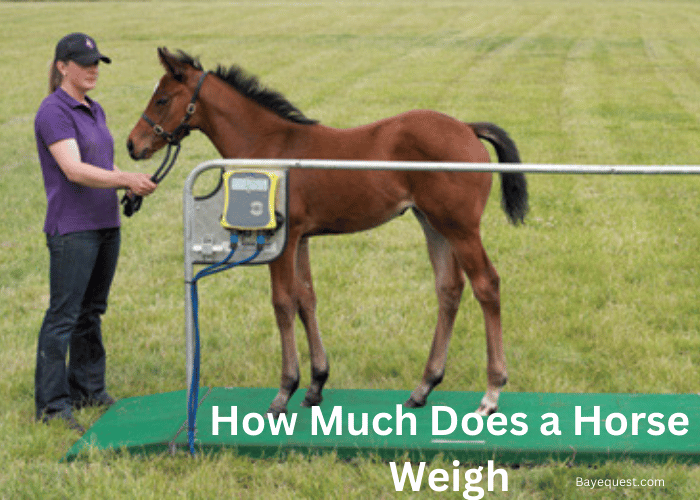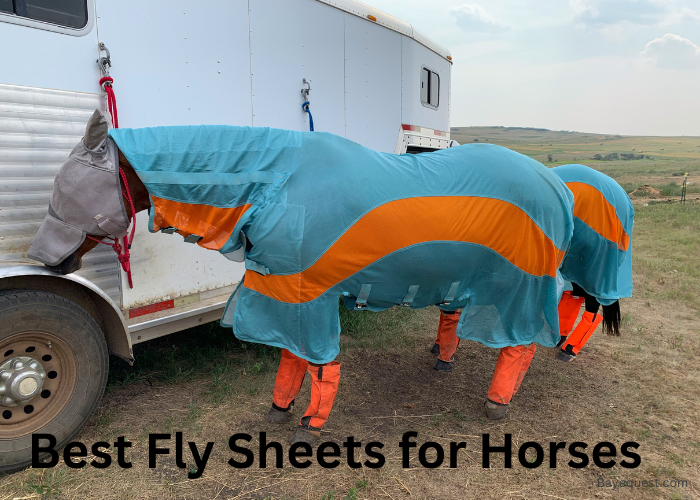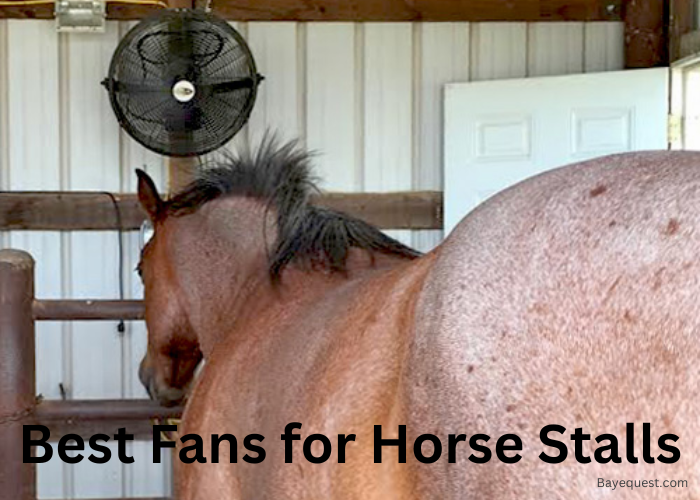Ever tried guessing a horse’s weight just by looking? It’s not as simple as it seems.
As an equine expert, I know the surprises and challenges of estimating a horse’s heft. Many owners and enthusiasts are puzzled by this question, which can affect everything from feeding to veterinary care.
In this article, we’ll uncover the key factors determining a horse’s weight and why it’s more intriguing than you’d think. Let’s demystify the weight of these majestic creatures together.
How Much Does a Horse Weigh? Key Takeaway
Horse weight varies widely. An average horse weighs between 900 and 1,200 pounds. Miniature horses range from 100 to 600 pounds, while larger breeds like draft horses can exceed 1,800 pounds. Factors influencing weight include breed, age, and health, making horse weight a variable metric.
How Much Does a Baby Horse Weigh?
A newborn foal, or baby horse, weighs about 10% of its mother’s weight. For instance, if the mare weighs 1,200 pounds, the foal might weigh around 120 pounds at birth.
Smaller breeds have lighter foals, with some weighing as little as 50 pounds. Foals gain weight rapidly, sometimes doubling their birth weight in just a few weeks.
Their early weight can vary based on breed, health, and nutrition. Ensuring proper care and feeding is crucial in these early days to support healthy growth and development.
This growth sets the stage for a healthy, strong adult horse.
How Much Does an Adult Horse Weigh?
The weight of an adult horse can vary greatly depending on its breed and size. Most adult horses weigh between 900 and 1,200 pounds.
However, smaller breeds or ponies might weigh as little as 400 pounds, while larger breeds like draft horses can tip the scales at over 1,800 pounds. Factors like diet, exercise, and overall health also play a big role in a horse’s weight.
Keeping an eye on these can help maintain a healthy weight, ensuring the horse remains fit and active. So, understanding and monitoring weight is key to equine care, whether it’s a petite pony or a hefty draft horse.
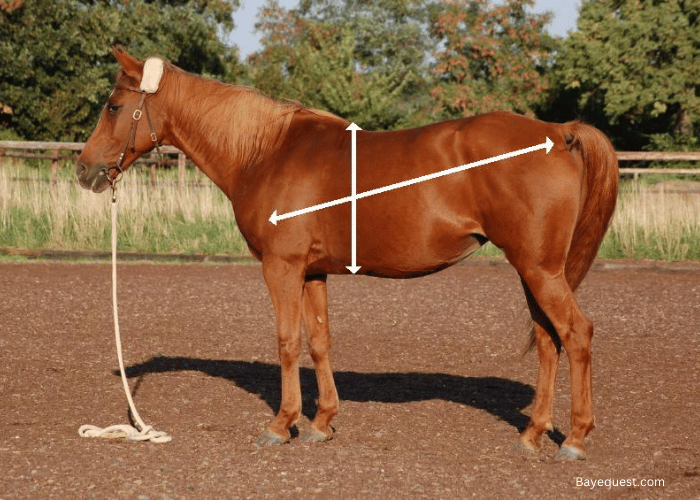
Average Horse Weight
| Horse Breed | Weight (kg) | Horse’s Weight in Pounds |
|---|---|---|
| Arabian | 360 – 450 | 794 – 992 |
| Belgian | 900 – 1,200 | 1,984 – 2,646 |
| Clydesdale | 820 – 910 | 1,808 – 2,006 |
| Friesian | 544 – 635 | 1,200 – 1,400 |
| Haflinger | 410 – 600 | 902 – 1,323 |
| Hanoverian | 544 – 635 | 1,200 – 1,400 |
| Miniature Horse | 40 – 90 | 88 – 198 |
| Mustang | 320 – 450 | 705 – 992 |
| Percheron | 850 – 1,100 | 1,874 – 2,425 |
| Quarter Horse | 500 – 650 | 1,102 – 1,433 |
| Shetland Pony | 160 – 200 | 353 – 441 |
| Shire | 850 – 1,100 | 1,874 – 2,425 |
| Standardbred | 400 – 545 | 882 – 1,202 |
| Thoroughbred | 450 – 600 | 992 – 1,323 |
| Welsh Pony | 270 – 400 | 595 – 882 |
| Andalusian | 410 – 510 | 902 – 1,124 |
| Appaloosa | 430 – 570 | 948 – 1,257 |
| Lusitano | 500 – 600 | 1,102 – 1,323 |
| Lipizzaner | 430 – 600 | 948 – 1,323 |
| Gypsy Vanner | 450 – 630 | 992 – 1,389 |
| Icelandic Horse | 330 – 380 | 728 – 838 |
| Dartmoor Pony | 200 – 320 | 441 – 705 |
| Connemara Pony | 290 – 390 | 639 – 860 |
| Fjord Horse | 500 – 600 | 1,102 – 1,323 |
| American Saddlebred | 450 – 550 | 992 – 1,213 |
| Dutch Warmblood | 540 – 640 | 1,190 – 1,410 |
| Tennessee Walking Horse | 410 – 545 | 902 – 1,202 |
| Paso Fino | 360 – 450 | 794 – 992 |
| Rocky Mountain Horse | 450 – 600 | 992 – 1,323 |
| Mongolian Horse | 270 – 370 | 595 – 816 |
| Arabian Cross | 400 – 500 | 882 – 1,102 |
| Trakehner | 500 – 600 | 1,102 – 1,323 |
| Holsteiner | 600 – 800 | 1,323 – 1,764 |
Benefits of a Healthy Weight
There are many benefits of maintaining a healthy horse weight. The following are a few reasons you should prioritize it in 2024;
Enhanced quality of life: A healthy weight guarantees increased happiness and energy. It also improves the quality of social interactions between horses, their owners, and other animals.
Optimal performance: Do you ride your horse or rely on them for various duties at home and in the fields? Do you participate in shows and contests? Healthy horses with a good weight are likelier to excel in their duties.
Reduced health risks: Obese or malnourished horses are at a greater risk of various health and medical issues. For example, overweight horses are at an increased risk of heart and respiratory issues, metabolic disorders, and joint problems. Meanwhile, malnourished horses often exhibit low energy, weakened immunity, and slow wound healing.
Digestive benefits: Proper weight improves digestion and optimizes nutrient absorption. This can reduce the need for supplements, lowering the feeding budget.
Mental health benefits: Weight directly impacts the horse’s mental well-being. Malnourished horses are more likely to exhibit stress signs. They are also shorter tempered. Meanwhile, obesity often causes a sense of helplessness, resulting in poor performance.
Weight and coat health: A healthy weight is often associated with a healthy, thriving skin and coat. In contrast, emaciated horses are characterized by poor coats with loose hairs and rashes.
Factors Influencing Horse’s Weight
The average weight of a horse depends on many factors, from breed to height and age. However, the most common weight determinants are;
Horse type
There are three types of horses: miniatures, ponies, and drafts. Miniature horses are the tiniest and, therefore, the most lightweight. The average miniature horse weighs 88-198 lbs.
Meanwhile, the average pony weighs 287 to 771 lbs. Finally, draft horses are large animals that weigh 1,763 to 2,204 lbs.
Breed
Some horse breeds are naturally larger and heavier than others. Generally, Belgian and Shire horses are the heaviest.
Individual horses from these two breeds weigh 1,700 to 2,400 pounds, with a few reaching 3,000 pounds. Clydesdales, Percherons, and Ardennais horses are also pretty heavy.
Meanwhile, Shetland ponies are the most lightweight, weighing a paltry 350 lbs. to 450 lbs. Dartmoor horses, British spotted ponies, and New Forest horses are also lightweight.
Height
Taller horses are often heavier as the bigger frames accommodate more flesh and muscle. But the vet will advise you on the appropriate weight range depending on the horse’s height.
Generally, a 191 cm tall should be 418 lbs. and 529 lbs. The figure rises 100 pounds for every 10 cm height increase. For instance, a 101 cm horse should weigh 529 lbs. to 617 pounds.
Meanwhile, a 171 cm tall horse should be 1,215 lbs. to 1,763 lbs.
Read also: How to Measure a Horse’s Height.
Age
Age greatly impacts weight and often determines the horse’s general health. Foals are the least heavy.
For instance, a newborn should be about 10% of the mother’s weight, meaning a 1,000-pound quarter horse should birth a 100-pound foal.
However, the younglings gain weight fast, typically 1.98 lbs. to 2.43 lbs. daily. This means the colt or filly should be about 50% of an adult’s weight by the end of the first year and 90% by two years old.
A healthy horse reaches full adult weight at four years.
Related read: Professional Horse Jockey Size.
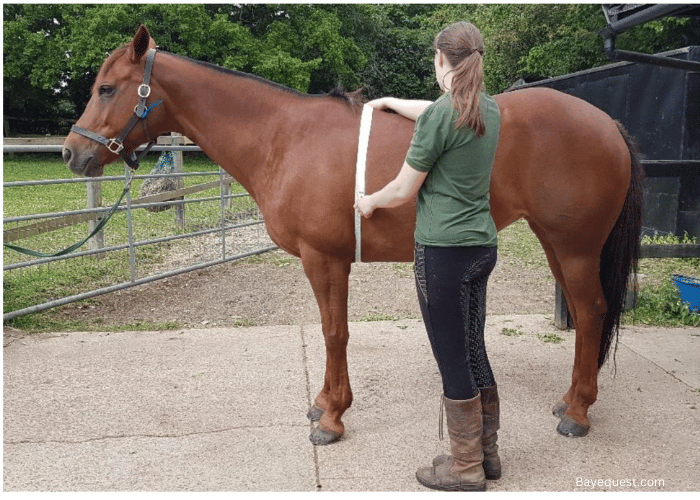
How To Measure a Horse’s Weight
Fortunately, you don’t have to rely on guesswork to determine your horse’s weight. The following are three widely acceptable ways to measure the weight;
Using a weighbridge
The traditional weigh scale or weighbridge is the most straightforward way to measure a horse’s weight.
Livestock weighbridges comprise large, heavy-duty platforms where the horse climbs. Then, the reader takes the measurements from a manual or digital scale.
However, a weighbridge can be so big that bringing it home makes little sense. Where would you store it to shield it from weather elements?
Moreover, a suitable weigh scale can cost hundreds of dollars. So, it’s not good value for money if you only own one horse.
But you may find one at the nearest veterinary office. Professional breeders and horse trainers also keep one on hand.
Using a Horse Weight Tape
The next easiest way to measure your horse’s weight at home is using a weight tape. You’ll find the specific instructions in the manual. But the procedure is generally the same.
You begin by measuring the horse’s length and circumference at the two identified points (refer to the tape’s guidelines). Then, multiply the length by girth-squared and divide the results by a given number.
So, the average weight = (length x girth x girth)/n, where n is a variable that changes depending on the horse type and age. N = 330 for adult horses, 301 for yearlings, 280 for weanlings, and 299 for ponies.
The general rule is that if you measure the length in inches, you’ll get the weight in pounds. Meanwhile, if you measure in centimeters, the resulting weight is in kilograms.
However, this method is only about 90% accurate. Nonetheless, you can use the figures for regular monitoring.
The Sasimowski and Budzynski formula
The Sasimowski and Budzynski formula is a more accurate and highly professional way to measure a horse’s weight.
It involves measuring the horse’s girth through two points and substituting the figures into a unique mathematical formula.
First, measure the horse’s girth through the shoulder joint and the horse’s buttocks. Then, measure the circumference at the chest behind the elbow and withers. Finally, substitute the figures into the formula below;
Weight = trunk circumference x chest circumference x breed factor
Breed indexes vary from 60-81. For example, the thoroughbred’s breed factor is 70, while ponies have a horse factor ranging from 60-63. Draft horses have the highest breed factor, ranging from 75-82. If you can’t find your horse’s breed factor on the list, use the average (75).
Body Condition Scoring (BCS)
Finally, the BCS method is a great way to score a horse’s weight. It scores horses on a scale ranging from 1-9. Horses that score 1.0 are extremely emaciated, while a 9.0 score infers extreme obesity. The healthiest horses score 4-5 points.
The assessment focuses on five body parts: neck/withers, shoulders, back, rib, and tailhead. However, it generally looks for fat. Palpable fat indicates obesity, while visible vertebrates (bones) suggest emaciation.
Read also: How Much Do Clydesdale Horses Weigh?
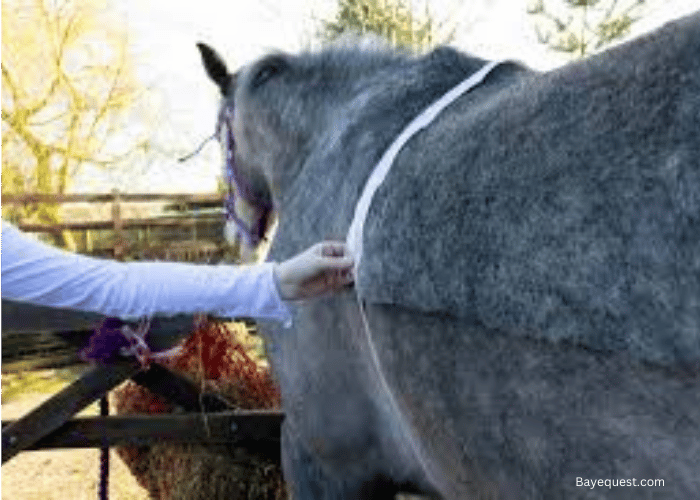
How to Manage a Horse’s Weight
There are two main ways to manage a horse’s weight: proper nutrition and a well-thought-out exercise routine.
Managing Weight Through Proper Nutrition
Horses need quality food in sufficient quantities to attain and maintain a healthy weight. Consider the following tips for optimal equine nutrition;
Tailored nutrition: Every horse is different. So, you need a personalized feeding program for the best outcome. The best program considers the horse’s breed, age, weight, activity level, and health concerns. Speak with your vet for additional advice.
Quality over quantity: Horses are heavy eaters who consume up to 50 pounds of hay and 10 gallons of water daily. Since this can be expensive, some owners prioritize quantity over quality to minimize maintenance costs. Unfortunately, you can only maintain a healthy weight using quality feed.
Limit treats and tidbits: It’s tempting to regularly indulge the horse in treats and tidbits as a sign of affection. But this isn’t healthy as it can quickly lead to obesity. Instead, focus on low-calorie feeds such as apples and carrots.
Manage grazing habits: Grazing is one of the best ways to feed horses. It’s convenient and cost-effective. Above all, it gives your horse the sense of freedom they crave. However, it works best if you manage the grazing zones, hours, and types of grasses.
Proper hydration: Horses need enough clean water throughout the day. It helps with digestion and overall health. Moreover, water carries nutrients and oxygen throughout the body. So, a shortage can be catastrophic for the horse’s wellbeing.
Managing Weight Through Exercises
Exercise is just as important as food in maintaining a healthy weight. Consider the following exercising tips for healthy equine weight.
Ensure regular exercise: Horses are natural athletes, as their physical disposition tells us. Unfortunately, many owners force their horses into a sedentary lifestyle, leading to weight gain. Ensure regular exercise in the open fields to ensure a healthy weight.
Varied exercises work best: Unfortunately, a few minutes running in the field isn’t sufficient. It helps only a few body parts. The best solution is a variated regimen that benefits each body part. For example, combine lunges with trail riding and saddle work with groundwork for the best results.
Personalize the routines: Horses benefit most from personalized exercise regimens targeting their unique needs. For example, consider the horse’s current weight and health condition when choosing exercise types and schedules. Also, consider their age and genetics.
Read also: How to Calculate the Ideal Size of a Horse.
Managing Underweight Horses
Underweight horses are at risk of poor performance and poor health. Their social lives also suffer. The following are a few tips to care for your undernourished horse;
Schedule a veterinary check: Speak with a licensed veterinarian before anything else. They’ll rule out underlying medical conditions and advise you accordingly.
Check roughage quality and quantity: Low-quality roughage doesn’t provide enough energy and nutritional value to sustain adequate horse weight. Also, ensure the horse gets sufficient amounts of roughage.
Allow the horse to graze outdoors: The grass outdoors contains more nutrients and proteins than hay and haylage. So, consider additional outdoor time to rebuild the horse’s weight.
Don’t overwork the horse: Give your horse workload commensurate with their age and size. Any extra work should be followed by additional grains and supplements to compensate for the lost energy.
Managing Overweight Horses
Overweight horses are in just as much danger as their underweight counterparts. Consider the following tips to restore healthy weight;
Check with your vet: Always speak with your vet before you take action. The vet will perform various tests to establish the root cause and advise you accordingly.
Review the horse’s diet: Obesity often stems from a poor diet with too many calories. Make adjustments to achieve a healthier diet and start calorie-counting if necessary.
Less grazing, more exercise: Make the horse work harder for every pound of pasture consumed. Also, walk them more and find creative ways to get them physically active.
What’s the Heaviest Horse Ever?
The Mammoth (born 1846) is the heaviest horse in history. Also known as Samson, the 219 cm (21.2 hands) Shire gelding weighed 3,360 lbs. (1,524 kg) at his peak. More recently, Big Jake, also a Shire, weighed 2,600 lbs. in 2021.
How Much Do Horses Weigh? Conclusion
The average horse weighs 1,100 to 1,300 lbs. But the actual weight varies from one horse to the next, depending on the breed, age, and health condition.
Generally, draft horses, specifically Shires and Belgian horses, are the heaviest, ranging from 1,700 to 2,400 lbs. Meanwhile, ponies and miniature horses weigh 400-700 lbs.




